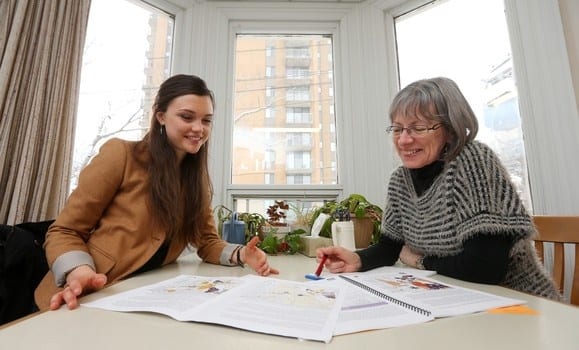
Today’s students, tomorrow’s architects and planners


Accredited through national peer review, these opportunities are respected by both employers and students alike — Dalhousie has a Cooperative Education (co-op) placement rate in Architecture exceeding 95%. Meanwhile, Bachelor of Planning Honours students are placed in internships. Facilitating their journeys is the Work-Integrated Learning & Co-operative Education office. It is a vital link between students and professional practice, from managing cooperative work placements to providing career guidance and resources.
On campus, student-led initiatives like the SHIFT Planning Conference, thought-provoking events like the Housing Engagement Series, inspiring alumni networking opportunities, and frequent dialogue on pressing issues like climate change and urban development foster a culture of creativity and collaboration.
Read on to explore first-hand student accounts of how Dalhousie’s Faculty of Architecture and Planning is empowering tomorrow’s future ready leaders.
Why is experiential education so crucial in the fields of architecture and planning? Because the challenges we face cannot be solved in isolation. In a field where sustainability, community engagement and social equity have become paramount, architects and planners can’t survive on technical skills alone — they must possess empathy, adaptability, and a deep understanding of the human experience.
And that’s where Dalhousie University's Faculty of Architecture and Planning thrives. At one of Canada’s top 15 research-intensive universities, education transcends textbooks and immerses students in real-world experience. Comprising a School of Planning and a School of Architecture, the faculty offers domestic and international co-op opportunities, which see students in professional architecture programmes (BEDS/MArch) and the Master of Planning gain firsthand experience that shapes their careers and their understanding of the world around them.
90%
of students participate in experiential and work-integrated learning each year
21,088+
students enrolled
$2 million
in academic research funding
OVER
94
Rhodes Scholars
5 degrees that unlock the complete experience
The Bachelor of Environmental Design Studies (BEDS) programme is a focused introduction to the creative and technical aspects of architecture — a crucial first step for students aspiring to become professional architects.
Spanning two years and designed for students with at least two years of prior university study, BEDS combines foundational courses in architectural design, history, building technology, and professional practice. A standout feature of the programme is its four-month co-op work term, where students gain hands-on experience in architectural offices.
Bachelor of Environmental Design Studies

The Master of Architecture (MArch) programme builds on the BEDS programme offering students a balanced and practical path toward a career in architecture.
This two-year programme combines design studio work, research, and a required co-op term, giving students the chance to gain real-world experience and apply their skills to industry challenges. In the final year, students complete a design thesis that integrates research and design thinking, showcasing their ability to approach complex architectural problems.
Master of Architecture

The Bachelor of Planning Studies (BPS) is a four-year interdisciplinary course focused on creating sustainable, equitable communities. On this route, students learn to address critical issues like food security, affordable housing, and sustainable transportation through lessons in urban design, environmental planning, and protecting sensitive landscapes. At the same time, students develop the skills to analyse community challenges and create impactful solutions while engaging in public involvement.
Bachelor of Planning Studies

The Master of Planning (MPlan) programme equips students to tackle global challenges like urbanisation, sustainability, and population growth. Accredited by the Canadian Institute of Planners, the programme combines academic learning with hands-on experience, including a co-op work term, ensuring graduates meet professional standards and are prepared for careers in urban and regional planning.
To further apply knowledge to practical solutions, student work closely with community groups, nonprofits, and industry leaders on real-world projects.
Master of Planning

The Master of Planning Studies (MPS) programme is tailored for professional planners looking to enhance their expertise through advanced research. Ideal for those with a strong foundation in planning, it explores topics like climate change, sustainable transportation, housing policy, and GIS applications.
Students can complete the program full-time or part-time over up to five years, with at least one winter semester of full-time study required.
Master of Planning Studies

Hear from the students
Opportunity-filled Halifax
From designing inclusive spaces to implementing innovative urban policies, the skills cultivated within Dalhousie’s Faculty of Architecture and Planning are in high demand within Canada and beyond. Studies report that between now and 2031, there will be 5,400 new job opportunities in this sector, and 5,700 new job seekers will be required to fill these vacancies in Canada. Globally, the architectural services market is estimated to reach US$585.57 billion by 2031.
Halifax's position as a hub for education and research in planning and architecture makes it a great place for training. Here, students benefit from being part of a dynamic environment where they engage with cutting-edge research, collaborate with industry professionals, and contribute to shaping the built environment of tomorrow.
Experiential learning explained by Dalhousie experts
“The Dalhousie School of Architecture is especially proud of its Free Labs programme, a unique, two-week summer intensive that offers students hands-on experience with projects carried out from start to finish. These projects often serve local communities, resulting in tangible outcomes that make a real impact.”

Émélie Desrochers-Turgeon,
Assistant Professor, School of Architecture, Dalhousie University
“The research activities related to my area often involve learning from persons with lived expertise of navigating accessibility barriers in the built environment. Our lab conducts interviews, focus groups, consultation sessions, and testing of accessibility infrastructure with these lived experts who have wealth of knowledge in design for accessible spaces that we cannot learn from textbooks. ”

Mikiko Terashima,
Associate Professor, School of Planning
“We hear back from employers directly and indirectly. As we see our students move from junior to intermediate planners to directors, we realise we have a role in ensuring they are prepared to enter the profession. Co-op provides our students with an opportunity to learn about what planners do on the job before graduating, making them one step closer to being prepared to join the planning profession. ”

Eric Rapaport,
Associate Professor, School of Planning
“I focus on issues and skill development opportunities that will help students as they begin their careers; this includes ensuring students have a solid understanding of research methodology and how being a good researcher has tremendous value even outside traditional academic pursuits. I also introduce students to various new activities (including the Kairos Blanket Exercise) and new perspectives via guest lectures worldwide.”

Chad Walker,
Assistant Professor, School of Planning

Copyright © 2024 Study International, official representative of Dalhousie University



